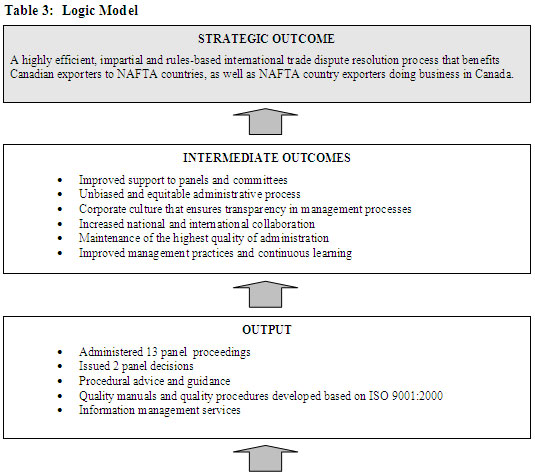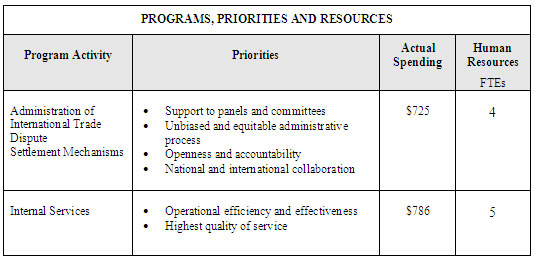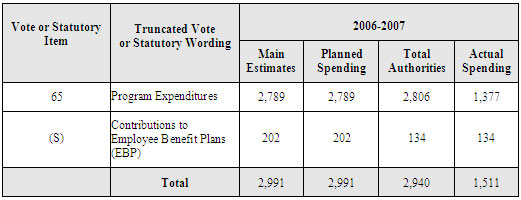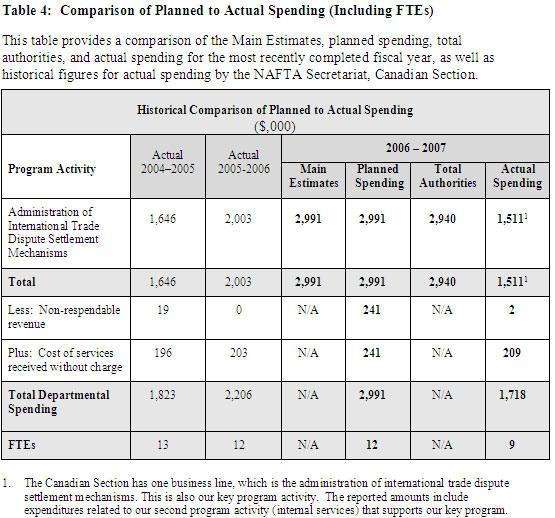Common menu bar links
Breadcrumb Trail
ARCHIVED - NAFTA Secretariat — Canadian Section
 This page has been archived.
This page has been archived.
Archived Content
Information identified as archived on the Web is for reference, research or recordkeeping purposes. It has not been altered or updated after the date of archiving. Web pages that are archived on the Web are not subject to the Government of Canada Web Standards. As per the Communications Policy of the Government of Canada, you can request alternate formats on the "Contact Us" page.
SECTION 2 – ANALYSIS OF PERFORMANCE BY STRATEGIC OUTCOME
2.1 Strategic Outcome
A highly efficient, impartial and rules-based international trade dispute resolution process that benefits Canadian exporters to NAFTA countries, as well as NAFTA country exporters doing business in Canada
It is increasingly clear that Canada’s economic prosperity will continue to be significantly defined by its success in the North American market. The NAFTA’s rules-based dispute resolution system provides critical stability and transparency for Canadian business as they continue to seek new opportunities and secure market access abroad. It is also crucial that the integrity of the rules-based framework continues to provide an effective means to resolve any trade dispute that may arise in such a large trading partnership. In this regard, the Canadian Section of the NAFTA Secretariat continues to provide services of the highest quality in the administration of international trade disputes settlement. Our strategic outcome is directly aligned with one of the Government of Canada’s outcomes, which is A Strong and Mutually Beneficial North American Partnership (see Table 2 below).

2.1.1 Program Activity
In its 2006-2007 Report on Plans and Priorities, the NAFTA Secretariat, Canadian Section identified only one program activity, which is the administration of international trade dispute settlement mechanisms. In addition, a second program activity has been defined as internal services, in line with the directives from the TBS. This program activity is used by all
departments and agencies to describe corporate services designed to deliver cost-effective support services that facilitate the achievement of departmental objectives.
The six priorities mentioned in the first section of this document are aimed at supporting and enhancing the Canadian Section’s ability to administer the dispute settlement mechanisms of the NAFTA. This approach enables alignment with the key co-delivery organizations.
The logic model shown in Table 3 on page 10 identifies the linkages between the activities of the NAFTA Secretariat, Canadian Section and the achievement of its strategic outcome. It shows the chain of results connecting resources and program activities to outputs and to expected results, intermediate outcomes and strategic outcome.
2.2 Performance Measure Strategy
At the completion of each panel review, the Canadian Section monitors client (panelists, assistant to panelists and counsel for participants) satisfaction with its services by requesting them to complete a Client Service Standards Monitoring Questionnaire. The most important service qualities clients are asked to rate include:
- accuracy, relevance and quality of information provided;
- the impartiality of the information;
- provision of guidance by senior staff on the dispute settlement processes, rules of procedures and code of conduct;
- accessibility of the staff;
- independence; and
- scheduling of panel hearings/conference calls/panel meetings.
This feedback enables the Section to evaluate its services on an ongoing basis and to maintain its high service standards. During the year under review, there were two cases filed in Canada. One of theses cases was terminated before panel selection and the other was stayed pending the final disposition of the judicial review proceeding before the Federal Court of Appeal. As a result, the client satisfaction monitoring survey could not be carried out.
The Canadian Section also obtains feedbacks on its program and activities from its employees at regular management meetings and other key strategic planning meetings. As well, the Canadian Section is committed to the highest standards of ethical behaviour in serving the Canadian public as reflected in its guiding principles (see ANNEX B).


2.3 Performance Accomplishments

In the 2006-2007 reporting period, the NAFTA Secretariat, Canadian Section administered a total of 13 panel proceedings, with 2 decisions issued. Two of these proceedings were completed and the remaining were still under review as at March 31, 2007. Status reports for
these cases are available on the NAFTA Secretariat website at http://www.nafta-sec-alena.org.
The following is the list of panel reviews administered during the year under review:
- Copper pipe fittings originating in or exported from the United States of America (Dumping) - CDA-USA-2007-1904-01;
- Unprocessed grain corn, excluding seed corn (for reproductive purposes), sweet corn and popping corn, originating in or exported from the United States of America (AD/CVD) – CDA-USA-2006-1904-01;
- Pure Magnesium from Canada (Full Sunset Review of the antidumping duty order) - USA-CDA-2000-1904-09;
- Certain Softwood Lumber Products from Canada (Dumping) - USA-CDA-2002-1904-02;
- Certain Softwood Lumber Products from Canada (Countervailing Duty) - USA-CDA-2002-1904-03;
- Magnesium from Canada (Five-Year Reviews of the Countervailing Duty and Antidumping Duty Orders) - USA-CDA-2004-1904-01;
- Certain Softwood Lumber Products from Canada (Final Results of Countervailing Duty Administrative Review and Rescission of Certain Company-Specific Reviews) - USA-CDA-2005-1904-01;
- Certain Softwood Lumber Products from Canada (Determination under Section 129(a)(4) of the Uruguay Round Agreements Act) - USA-CDA-2005-1904-03;
- Certain Softwood Lumber Products from Canada (Antidumping Duty Determination under Section 129 of the Uruguay Round Agreements Act) - USA-CDA-2005-1904-04;
- Certain Softwood Lumber Products from Canada (Final Results of Antidumping Duty Administrative Review) - USA-CDA-2006-1904-01;
- Certain Softwood Lumber Products from Canada (Final Countervailing Duty Administrative Review) - USA-CDA-2006-1904-02;
- Carbon and Certain Alloy Steel Wire Rod from Canada (Final Results of Antidumping Duty Administrative Review) - USA-CDA-2006-1904-04; and
- Certain Softwood Lumber Products from Canada (Final Scope Ruling) - USA-CDA-2006-1904-05.
Additionally, during the period under review, the Canadian Section provided services such as translations, distribution of documents, record-keeping, safeguarding and dissemination of records of completed panel reviews. It also provided logistical planning for panel meetings and hearings, administrative and accounting services, as well as procedural guidance regarding the rules of procedures and the Code of Conduct to counsel for participants, panelists and assistants to panelists.
2.3.1 Support to Panels and Committees
The NAFTA Secretariat, Canadian Section is committed to administer the dispute settlement processes in a timely, fair and effective manner. The major tasks include case management, administrative, technical and logistical support to panels and committees, including the administration of a court-like registry at a level comparable to other registries of superior courts of
record in Canada.
To this end, the Canadian Section:
- planned and coordinated activities to provide logistical support to all panels;
- ensured fair and equitable procedural and administrative services based on the legal principles and the rules and regulations applicable to the proceedings;
- administered and operated a court-like registry for the filing and processing of panel review documents; and
- continued to use its website to disseminate information on dispute settlement matters. The trilateral website (www.nafta-sec-alena.org) received over 2.65 million hits over the past three and a half years, while the Canadian Section site (www.nafta-sec-alena.org/canada/index_e.aspx) received 207,206. The high traffic can be attributed to the ease of access to a large volume of information made available on the websites. They have proven to be a cost-effective and timely way of disseminating information to the visitors. In this regard, the Email Updates notification initiative started three years ago has now stabilized to over 1,600 subscribers. The newsletter announces the filing of new panel reviews and the issuance of panel decisions.
2.3.2 Unbiased and Equitable Administrative Process
Fundamental to the effectiveness of the NAFTA Secretariat is its independence from the three national governments. This independence allows it to offer impartial procedural guidance and equitable administrative support to the participants and panels of experts who hear and decide on cases brought before them. To this end, the Canadian Section is committed to applying fair and equitable procedural and administrative practices that are governed by the rules and regulations as well as legal principles applicable to the proceedings.
In January 2007, the Canadian General Standards Board audited the management systems implemented by the NAFTA Secretariat, Canadian Section and verified that it conforms to the requirements specified in the ISO 9001:2000 standards. As a result, our management quality system has been certified and as explained in our 2006-2007 RPP, we joined the Mexican Section accomplishments in this regard. The ISO certification is well respected in the business community and the NAFTA Secretariat therefore adds to its credibility in the management of trade disputes.
2.3.3 Openness and Accountability
The NAFTA Secretariat, Canadian Section is committed to the promotion of a corporate culture that ensures transparent management processes and accountability to the NAFTA Free Trade Commission and the public.
To this end, the Canadian Section:
- continued its effective participation in the NAFTA Chapter 19 Operation Working Group, which comprises the representatives of the Parties, their investigating authorities and the three national sections. The activities are aimed at improving the operations of the dispute settlement processes; and
- continued to promote the full understanding of Canada’s free trade goals and achievements to all levels of government, the private and voluntary sectors, individuals and the media through the provision of effective communication, in particular by the agency’s Secretary.
2.3.4 National and International Collaboration
Collaboration with the other national sections in the joint administration of panels as well as in the joint development of policies and programs aimed at facilitating the operations of the dispute resolution processes is of paramount importance in fulfilling the mandate of the NAFTA Secretariat.
To this end, the Canadian Section:
- continued its coordination and collaborative endeavour with the other national sections in the joint administration of dispute settlement panels; and
- continued the consultation with our counterparts in the other national section on the multi-year project of digitization of all completed panel review documents for preservation, speedy retrieval process and research purposes. To date, the completed Canadian and Mexican cases have been digitized.
2.3.5 Operational Efficiency and Effectiveness
The NAFTA Secretariat, Canadian Section is committed to employing new information technologies to further develop and enhance systems and processes that improve the overall efficiency of the dispute settlement processes and staff productivity.
In this context, the Canadian Section,
- provided financial administration support to panels and committees;
- made available to the general public, through local municipal libraries’ inter-library loan protocol, the Canadian Section’s reference centre collection (see http://www.nafta-sec-alena.org/canada/index_e.aspx?CategoryId=79). In 2006-2007, the Canadian Section invested over $18,000 in acquisitions of new books.
- upgraded information technology infrastructure, security, licence and maintenance of the network with a total cost of $120,000; and
- carried out consultation work with other national sections for the redesign of the NAFTA website and the Registry Information System during the next fiscal year. This is necessary because the Registry Information System was developed in 2001/2002 and it needs to be redesigned to meet our evolving needs. As well, the websites need to conform to the new Common Look and Feel Standards for the Internet (CLF 2.0).
2.3.6 Highest Quality of Service
The NAFTA Secretariat, Canadian Section is committed to maintaining the highest quality of service in the administration of dispute settlement mechanisms. As well, it continued to promote employee professional development in order to maintain high level of expertise. Additionally, it further improved professional services and corporate management frameworks, policies and processes.
In that regard, the Canadian Section continued to put sustained emphasis on the strategic management of human resources to ensure that it recruited competent and devoted employees who remained with the organization, by offering a workplace atmosphere that promotes learning and professional development for all. The goal is to ensure that employees and managers have the knowledge and skills to meet evolving mandatory job requirements in order to offer an exceptional support and service continuity to our clients - trade law experts and judges chosen by national governments that adjudicate trade disputes brought before them.
To achieve this goal, during the year under review, the Canadian Section developed a new Policy on Talent Management, which reflects the new changes brought forward with the implementation of the Public Service Modernization Act and the new powers delegated to Head of Agencies. As a result of this policy, the Canadian Section has established adequate qualification criteria for the recruitment, learning, development and retention of its personnel. Employees are provided with the appropriate initial, continuing and specialized training as may be deemed necessary to acquire and maintain the level of expertise required to do their job and achieve their career goals. The cost associated with training was $48,700 and the implementation of the policy was $20,000. Additional services without charges were also received from the Small Agencies Transition Support Team.
Also, the Canadian Section now makes available to all its new employees a welcome kit that provides key information on getting acquainted with work practices in the Federal Public Service. Lessons learned over past years indicate that an individual’s integration in a small organization shall not be taken for granted.
2.4 Financial Information
Tables 4 to 6 shown below provide comparison of planned and actual spending, voted resources and net cost of the NAFTA Secretariat, Canadian Section.
Complete financial statements are enclosed in ANNEX C. The have been prepared in accordance with accrual accounting principles. The unaudited supplementary information presented in the financial tables in the DPR is prepared on a modified cash basis of accounting principles in order to be consistent with appropriations-based reporting. Note 3 on page 30 of the financial statements reconcile these two accounting methods.
Table 5: Voted and Statutory Items
This table explains the way Parliament voted resources to the NAFTA Secretariat, Canadian Section, and basically replicates the summary table listed in the Main Estimates.

Table 6: Net Cost of Program
This table shows the net cost of the NAFTA Secretariat, Canadian Section. It begins with the actual spending and adds services received without charge to arrive at the net cost of the department to Canadians.


